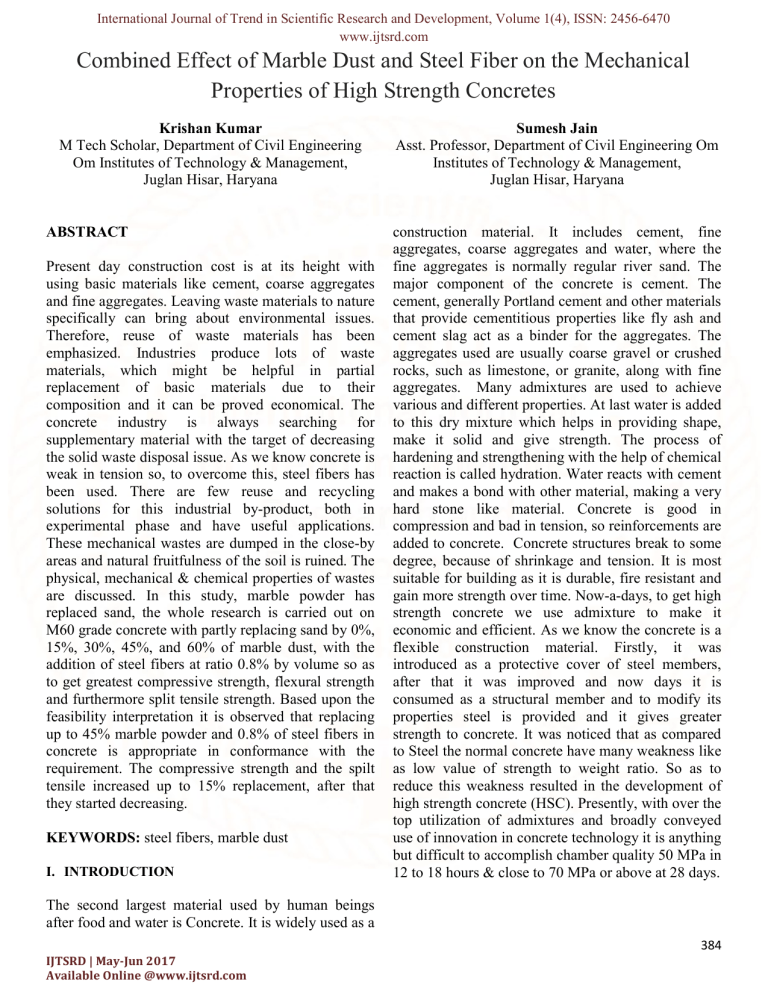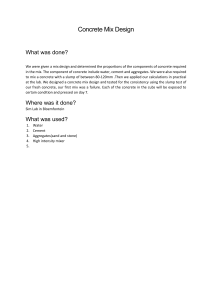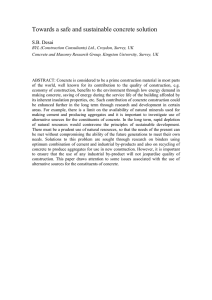
International Journal of Trend in Scientific Research and Development, Volume 1(4), ISSN: 2456-6470
www.ijtsrd.com
Combined Effect of Marble Dust and Steel Fiber on the Mechanical
Properties of High Strength Concretes
Krishan Kumar
M Tech Scholar, Department of Civil Engineering
Om Institutes of Technology & Management,
Juglan Hisar, Haryana
ABSTRACT
Present day construction cost is at its height with
using basic materials like cement, coarse aggregates
and fine aggregates. Leaving waste materials to nature
specifically can bring about environmental issues.
Therefore, reuse of waste materials has been
emphasized. Industries produce lots of waste
materials, which might be helpful in partial
replacement of basic materials due to their
composition and it can be proved economical. The
concrete industry is always searching for
supplementary material with the target of decreasing
the solid waste disposal issue. As we know concrete is
weak in tension so, to overcome this, steel fibers has
been used. There are few reuse and recycling
solutions for this industrial by-product, both in
experimental phase and have useful applications.
These mechanical wastes are dumped in the close-by
areas and natural fruitfulness of the soil is ruined. The
physical, mechanical & chemical properties of wastes
are discussed. In this study, marble powder has
replaced sand, the whole research is carried out on
M60 grade concrete with partly replacing sand by 0%,
15%, 30%, 45%, and 60% of marble dust, with the
addition of steel fibers at ratio 0.8% by volume so as
to get greatest compressive strength, flexural strength
and furthermore split tensile strength. Based upon the
feasibility interpretation it is observed that replacing
up to 45% marble powder and 0.8% of steel fibers in
concrete is appropriate in conformance with the
requirement. The compressive strength and the spilt
tensile increased up to 15% replacement, after that
they started decreasing.
KEYWORDS: steel fibers, marble dust
I. INTRODUCTION
Sumesh Jain
Asst. Professor, Department of Civil Engineering Om
Institutes of Technology & Management,
Juglan Hisar, Haryana
construction material. It includes cement, fine
aggregates, coarse aggregates and water, where the
fine aggregates is normally regular river sand. The
major component of the concrete is cement. The
cement, generally Portland cement and other materials
that provide cementitious properties like fly ash and
cement slag act as a binder for the aggregates. The
aggregates used are usually coarse gravel or crushed
rocks, such as limestone, or granite, along with fine
aggregates. Many admixtures are used to achieve
various and different properties. At last water is added
to this dry mixture which helps in providing shape,
make it solid and give strength. The process of
hardening and strengthening with the help of chemical
reaction is called hydration. Water reacts with cement
and makes a bond with other material, making a very
hard stone like material. Concrete is good in
compression and bad in tension, so reinforcements are
added to concrete. Concrete structures break to some
degree, because of shrinkage and tension. It is most
suitable for building as it is durable, fire resistant and
gain more strength over time. Now-a-days, to get high
strength concrete we use admixture to make it
economic and efficient. As we know the concrete is a
flexible construction material. Firstly, it was
introduced as a protective cover of steel members,
after that it was improved and now days it is
consumed as a structural member and to modify its
properties steel is provided and it gives greater
strength to concrete. It was noticed that as compared
to Steel the normal concrete have many weakness like
as low value of strength to weight ratio. So as to
reduce this weakness resulted in the development of
high strength concrete (HSC). Presently, with over the
top utilization of admixtures and broadly conveyed
use of innovation in concrete technology it is anything
but difficult to accomplish chamber quality 50 MPa in
12 to 18 hours & close to 70 MPa or above at 28 days.
The second largest material used by human beings
after food and water is Concrete. It is widely used as a
384
IJTSRD | May-Jun 2017
Available Online @www.ijtsrd.com
International Journal of Trend in Scientific Research and Development, Volume 1(4), ISSN: 2456-6470
www.ijtsrd.com
II. MATERIAL AND DESIGN
METHODOLOGY
High Strength Concrete It is a term used to define
concrete with the main properties not attributed to the
normal concrete. Its cube strength lies between 60 to
100 N/mm2. With the use of local materials this
strength is not easy to acquire. Therefore the selection
of the materials is required to achieve the High
Strength Concrete.
The development of HSC will require Ordinary
Portland cement of 53 grades to get better
workability and strength. The various physical
properties are required for cement to be used in
HSC are:Maximum Blaine fineness
: 4000
2
cm /gm
Maximum 7 day cube strength
: 28.959
MPa
Marble Dust with the development and advancement
in the field of new technologies with artificial and
waste material the burden on utilization of natural
resources is significantly reduced. The mechanical
properties can be improved by the alternative use of
materials which significantly improve properties of
concrete by replacing it with sand. The alternative
material which is being used is waste marble dust.
The marble dust has been generally used as a building
material. It is produced during sawing and shaping of
marbles. Dumping material elsewhere cause
environmental pollution. Therefore utilization of
waste material also contributes towards reducing
environmental problem. This project focuses on
investigating the probability of using marble dust as a
partial replacement of sand by weight in the concrete.
Steel Fibers Reinforced Concrete: Fibers reinforced
concrete comprises of combination of four different
systems, like cement, water, coarse aggregates, fine
aggregates and dispersion of discontinuous, steel
fibers. Admixture and pozzolans may also be added to
the system of conservative concrete. Under the ASTM
specifications all the admixtures are used in concrete
desirable for use in Steel Fibers reinforced concrete
(SFRC).
Typical practical ranges of fibers reinforcement of
concrete
Approx. Vol.
Fraction of
Fibers
Matrix
Example
Concrete
PP in pipe caps
Concrete
(smaller size
agg.)
Pavements, Joints
Mortar
Cement sheets,
repairs
Paste, Slurry
Asbestos cement
sheets, slurry
Vf < 0.5%
0.5 < Vf <
3%
3 < Vf < 8%
8 < Vf <
20%
Chemical and Physical Properties of Cement and
Marble dust: Chemical Properties and Physical
properties of both Ordinary Portland Cement (OPC)
and Marble Dust (MD) were studied by various
scientists
as
shown
in
Table
Chemical Composition limits of Portland cement
Chemical Composition
(%by mass)
Bahar Demirel
(2010)
G.D.Dhawale et
al. (2014)
Alyamac et al.
(2015)
Alumina (Al2O3)
5.62
3.0-8.0
5.34
Calcium oxide (CaO)
62.94
60-67
62.62
Iron oxide (Fe2O3)
3.24
0.5-6.0
4.03
Magnesium oxide (MgO)
2.73
0.1-4.0
2.05
385
IJTSRD | May-Jun 2017
Available Online @www.ijtsrd.com
International Journal of Trend in Scientific Research and Development, Volume 1(4), ISSN: 2456-6470
www.ijtsrd.com
Sulphur trioxide (SO3)
-
-
2.69
Silicon Dioxide (SiO2)
21.12
17-25
19.45
Specific gravity, g/cm3
3.10
3.15
-
Physical Properties of OPC
Physical Composition
Bahar Demirel (2010)
G.D.Dhawale et al. (2014)
Specific gravity, g/cm3
3.10
3.15
EXPERIMENTAL PROGRAMMES
1 Cement
Physical properties of Ordinary Portland cement (OPC)
Sr. No.
Characteristics
Experimental
value
Values as per
IS: 12269-1987
1.
Standard
consistency (%)
29
-
2.
120
30 (minimum)
185
600 (maximum)
4.
Initial Setting time
(min)
Final Setting time
(min)
Specific Gravity
3.15
-
5.
Fineness
0.097
0.1%
3.
Compressive Strength ( 1:3)
6.
3 Days
45.21 N/mm2
33.71 N/mm2
7 Days
54.82 N/mm2
46.32N/mm2
28 Days
69.32 N/mm2
58.82 N/mm2
386
IJTSRD | May-Jun 2017
Available Online @www.ijtsrd.com
International Journal of Trend in Scientific Research and Development, Volume 1(4), ISSN: 2456-6470
www.ijtsrd.com
Mixture Proportioning
Mix proportions of various Mixes
HSC
Mixes
Cement
FA
(kg/m3) (kg/m3)
MD
(%)
MD
CA
SF (%) Water
(kg/m3) (kg/m3)
(kg/m3)
w/c
SP (%)
Mix 1
555.96
500
0
0
1169.89
0
172.32
0.31
1
Mix 2
555.96
425
15
75
1169.89
0.8
172.32
0.31
1
Mix 3
555.96
350
30
150
1169.89
0.8
172.32
0.31
1
Mix 4
555.96
275
45
225
1169.89
0.8
172.32
0.31
1
Mix 5
555.96
200
60
300
1169.89
0.8
172.32
0.31
1
Flexural Strength
Flexural Strength of various HSC mixes
HSC
Mixes
Mix 1
Mix 2
Mix 3
Mix 4
Mix 5
7 Days
FS
(N/mm2)
7.43
28 Days
Avg. FS
(N/mm2)
7.33
FS
(N/mm2)
8.32
7.32
8.05
7.24
8.28
8.4
8.38
9.84
8.52
9.76
8.22
9.86
8.15
8.12
9.34
8.25
9.40
7.93
9.64
8.05
7.82
8.66
7.86
8.37
7.55
8.56
5.95
5.95
6.02
6.08
6.35
5.82
6.32
Avg. FS
(N/mm2)
8.21
9.82
9.46
8.53
6.23
387
IJTSRD | May-Jun 2017
Available Online @www.ijtsrd.com
International Journal of Trend in Scientific Research and Development, Volume 1(4), ISSN: 2456-6470
www.ijtsrd.com
CONCLUSION
Flexural Strength
This study was attempted to investigate the flexural
strength, split tensile strength and compressive
strength of concrete with various level of replacement
of sand with marble dust and with the addition of steel
fiber content. Sand was partly replaced by marble dust
i.e. 0%, 15%, 30%, 45%, 60% and also steel fibers
were added at percentage of 0.8% in all the batches.
Super plasticizer “BASF- PCE BASE 50” was used in
all HSC mixes at 1% by the weight of the cement.
Current research shows that the physical and
mechanical of concrete improves with the addition of
waste materials.
The curve and the bar chart of the flexural strength
test shows that the flexural strength of the concrete
increased up to 15%, after that started decreasing. The
highest increment was at 15% replacement of the
marble dust and added 0.8% of steel fiber nearly gave
20% at 28 days of curing. The increase in flexural
strength of concrete is due to the lower fineness
modulus which provides cohesiveness property to the
material.
Fresh Concrete Properties
The HSC mixes have a slump flow lying in the range
500-700 mm. With the increase of waste materials the
slump decreased. The concrete workability is
inversely proportional to the content of marble
powder. However, it is worthwhile to know that the
required workability of the concrete is possible to
achieve with & without chemical additives.
Compressive Strength
The compressive strength increased up to 45%
replacement, after that strength started decreasing.
With lower w/c ratio, the use of marble dust as sand
replacement proved to be more effective. The highest
increment was at 45% replacement of marble dust and
added 0.8% of steel fiber nearly 9% at 28 days of
curing. After 45% replacement there was decrement
in compressive strength because marble dust shows
pozzolonic property due to which it affects the
properties of cement.
Split Tensile Strength
The curve and bar chart of split tensile strength test
shows that the split tensile strength of the concrete
increased up to 15%, after that started decreasing. The
w/c ratio remained constant i.e. 0.31 for all mixes.
Increase in the cohesiveness of the material due to
lower fineness modulus of the marble dust so it
increases the split tensile strength. The highest
increment was at 15% of marble dust and 0.8% of
steel fiber nearly gave 4% at 28 days of curing.
REFERENCES
[1] Demirel, Bahar. (2010). The effect of using
waste marble dust as fine sand on the
mechanical
properties
of
concrete.
International Journal of the Physical Sciences
5.9: 1372-1380.
[2] IS: 4031 (Part 4, 5&6)-1988: Methods of
Physical Tests for Hydraulic Cement, Bureau
of Indian Standard, New Delhi (India)
[3] IS: 383-1970: Specification for coarse and fine
aggregates from natural sources for concrete,
Bureau of Indian standard, New Delhi (India)
[4] IS: 516 (1959) Indian standard code of
practice- methods of tests for strength of
concrete, Bureau of Indian standard, New
Delhi (India)
[5] IS: 5816 (1999) Methods of test for splitting
tensile strength of concrete, Bureau of Indian
standard, New Delhi (India)
[6] ASTM C1585 (2007) Standard test method for
measurement of rate of absorption of water by
hydraulic-cement concretes
[7] Hameed M., Sekar S. (2009). Properties of
green concrete containing quarry rock dust and
marble sludge powder as fine aggregates.
India, ARPN Journal of Engineering and
Applied Sciences 4 (4) 83-89
[8] Heboub H., Aoun H., Belacia M., Houari H.,
Gorbel E. (2010). Use of waste marble
aggregates in concrete. Construction and
Building Material 25: 1167-1171
[9] Sirulea P.A. (2012). Partial replacement of
cement wit marble dust powder, International
Journal of Advanced Engineering Research
and Studies E-IISN 2249-897
388
IJTSRD | May-Jun 2017
Available Online @www.ijtsrd.com



